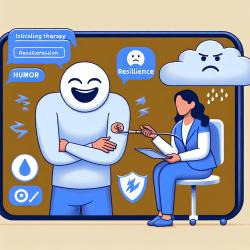In today's fast-paced world, stress is an unavoidable part of life. As practitioners, it's crucial to stay updated with the latest research to improve our skills and outcomes for the children we serve. A recent study titled Exploring User-Related Drivers of the Early Acceptance of Certified Digital Stress Prevention Programs in Germany provides valuable insights that can help us enhance our online therapy services.
Here are some key takeaways from the study:
- Positive Attitudes Drive Acceptance: The study found that positive attitudes towards digital stress prevention programs significantly predict their acceptance. As practitioners, we can foster these attitudes by providing tailored information to parents and children about the benefits of online therapy.
- Openness to Experience: Individuals who are open to new experiences are more likely to accept digital stress prevention programs. Encouraging a mindset of curiosity and openness in our clients can make them more receptive to online therapy.
- Preference for Delivery Modes: The study revealed a preference for face-to-face interactions over online and blended formats. However, blended formats were still preferred over stand-alone online programs. This suggests that combining digital and in-person elements could enhance the effectiveness of our therapy sessions.
Implementing these findings can help us create more effective and engaging therapy programs for children. Here are some practical steps you can take:
- Educate and Inform: Use newsletters, social media, and parent meetings to share the benefits of digital stress prevention programs. Highlight success stories and evidence-based outcomes to build positive attitudes.
- Foster Openness: Encourage children and parents to try new activities and approaches within the therapy. This can help build a culture of openness to new experiences, making them more receptive to digital interventions.
- Blend Formats: Consider incorporating both digital and face-to-face elements in your therapy sessions. For example, you could use online tools for practice and reinforcement while maintaining in-person sessions for personalized guidance.
By leveraging these insights, we can enhance our online therapy services and create better outcomes for the children we serve. To read the original research paper, please follow this link: Exploring User-Related Drivers of the Early Acceptance of Certified Digital Stress Prevention Programs in Germany.










